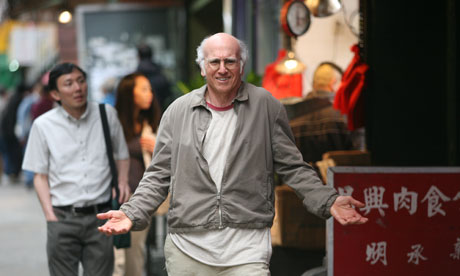Sunday, October 14, 2012
Whatever Works - A Short Analysis & Thoughts
After a short day in which my Psychology class became the only significance I could find for the 12 hours I had been awake I decided to finally watch Woody Allen's 2009 Comedy/Romance Whatever Works. After reading a few reviews of the film after seeing it I came to realize I may be in the minority of opinions on the film.
Whatever Works takes a dive into a peculiar style of narration that hasn't been experimented with in quite some time. Especially not to the extreme that Woody Allen takes it compared to his earlier films. This of course is the aspect in which our protagonist Boris Yelnikoff (Larry David) speaks directly to us; the audience. Breaking the 4th wall. You really feel like it's Allen himself speaking directly to you in these long sequences where we get a detailed diagram inside the mind of Yelnikoff via Woody Allen's brilliant writing and Larry David's flawless, authentic style of acting. This film as a whole feels much like a roller coaster ride through the nooks and cranny's of the deepest thoughts in Woody Allen's brain - and not just a tricky love story between a few fictional characters. I don't mean to look down upon any of Allen's other recent films, because I love them all. I really do. I'm one the few who actually loves Anything Else.
There is a specific facet of comedy in Whatever Works that I must say I have never seen. I'm not claiming to be any sort of cinefile, so don't bark at me and say this film, and that film did this years ago. Please politely recommend these films to me in a nice and orderly manner. Anyway, the facet of comedy that I'm speaking of are the sequences where Boris acknowledges that there are many people standing around all of them watching and listening. This is never followed through with a confirmation that there are in fact a group of people, maybe even a camera crew around them though. There are a few times in the film where we get a very personal feeling toward the characters when they stare right into our eyes as they look for these people that Boris apparently sees. At the end of the film this is utilized to convey that Boris's genius is his crutch. He sees the big picture, therefore he can't exactly live happily and relaxed. He knows too much.
One interesting feature in this film is the shift of powers between the protagonist (Boris) and the Antagonist (Melody). I found myself rooting for Boris's genius, complex thought's on the everyday life, universe and religion. I thought he'd be the perfect guy to teach this young lady a thing or two about reality and life to help her. This was interested, because toward the end of the film Boris's ways became quite tragic and eventually led to his breakup with Melody, which in turn changed my perspective on who was really the teacher here. Melody had taught Boris to not be so cynical all the time. Although he does eventually embrace his genius and his views on life - he does become a much happier and emotionally fulfilled man by the end of the film.
It made perfect sense to me when I discovered that Allen wrote this screenplay in the 70's. It has the closest resemblance of the tone of early Woody Allen films such as Annie Hall, and Manhattan.
I truly adore all of Woody Allen's films that have come after Whatever Works, although there is part of me that wishes more of them would resemble the similar tone and comedy that Whatever Works obtains.
Now for my last note:
Dear Woody Allen,
Please cast Louis C.K. as the lead in your next film.
Thank You,
Michael M. Jones
Subscribe to:
Post Comments (Atom)




No comments:
Post a Comment